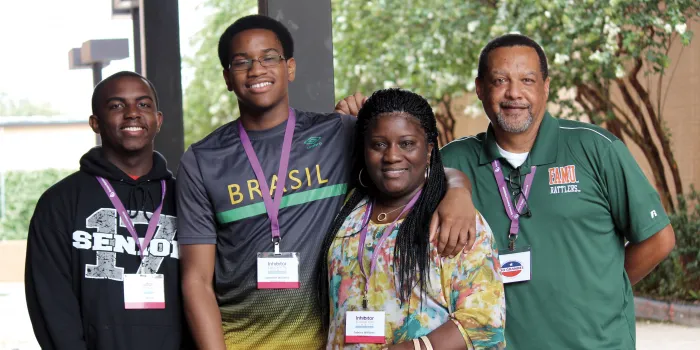Living with hemophilia with inhibitors is difficult. The inhibitor—a development of antibodies to infused factor product—makes it more difficult to control bleeds. This in turn can lead to missing school or work, and the potential for long-term joint damage. There is a great need for support for both affected people and caregivers, and the National Hemophilia Foundation (NHF) has worked for 12 years to provide that support in the form of NHF’s Inhibitor Education Summits.
The summits are three-day conferences that provide education for people with hemophilia with inhibitors and their support networks. The 2017 summits—held in Phoenix on June 1-4, Houston on June 22-25, and Baltimore on October 12–15—expanded their offerings into six tracks: adult siblings/carriers; new families; seasoned families; nonparent support network; older affected adults; and teens and young adults. “The reality of living with a chronic disease in 2018 is that the caregiving and support network often expands beyond the immediate family to include grandparents, siblings, cousins, friends—you name it,” says Sarah Waite-Ardini, manager of education at NHF, who oversees the program. “It was important to us and the steering committee that the summits reflect that.”
Another change to the summits was the introduction of “inhibitor teams.” Attendees were randomly assigned to a group that met at the end of each day for a 15-minute discussion. The idea was inspired by a similar dynamic at the European Hemophilia Conference. “We wanted to give our attendees the opportunity to make connections that they might not make on their own,” says Waite-Ardini. She also noted that summit attendees learn so much from each other that she felt it was important to carve out extra time to allow for those conversations. The end-of-day debrief was facilitated either by summit faculty or an NHF staff member.
“The idea of teams was a wonderful idea and helped build relationships with people you otherwise might not have interacted with,” says Josie Hernandez, who attended the Houston summit.
Sessions covered pain management and safe use of opioids; immune tolerance therapy; an explanation of factor half-life and how it can be used to guide treatment; and three plenary sessions on new and emerging therapies, possible changes in the insurance and healthcare landscape, and participation in clinical trials.
But for many people, the greatest value is in connecting with others who share their experience. “There was a time in my life where I thought nobody would ever understand what it’s like to be living with an inhibitor. Thanks to these summits, I now realize how wrong I was,” says Benjamin Denman, who attended the Baltimore summit.
NHF is grateful for the support of this patient education program from founding sponsor Novo Nordisk; supporting sponsor Shire; and corporate sponsors Genentech, Grifols and HEMA Biologics.

